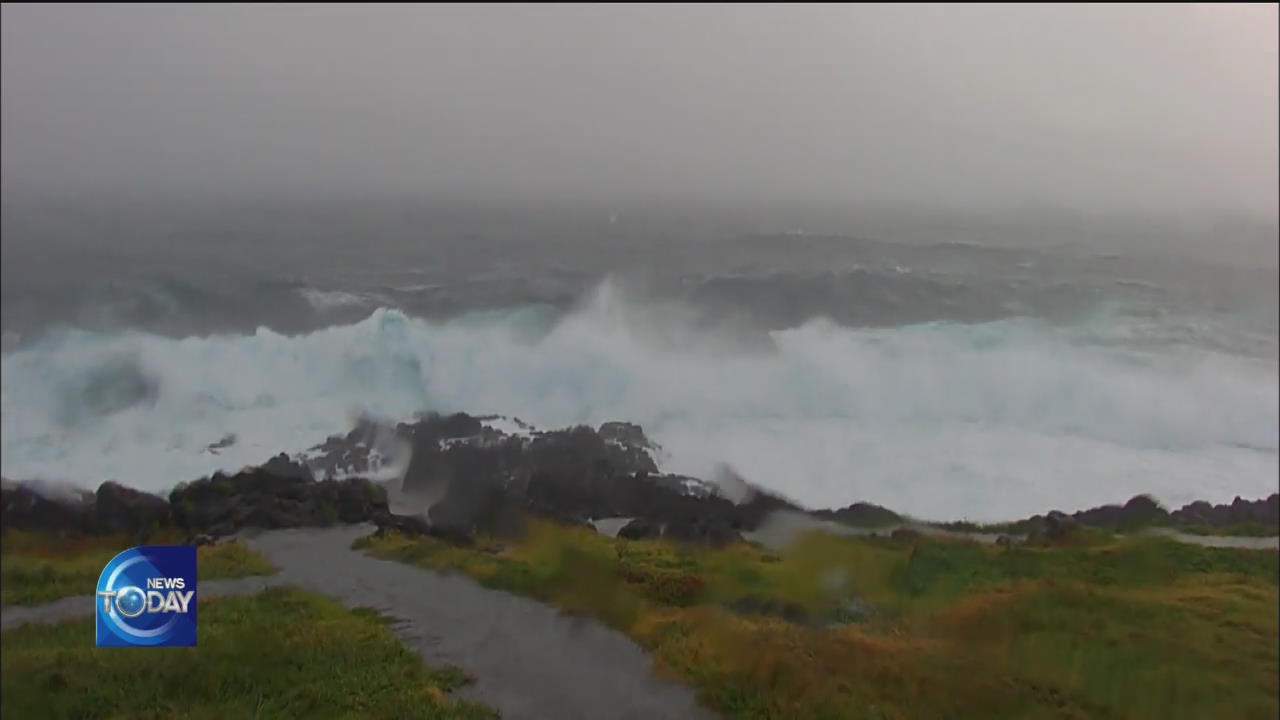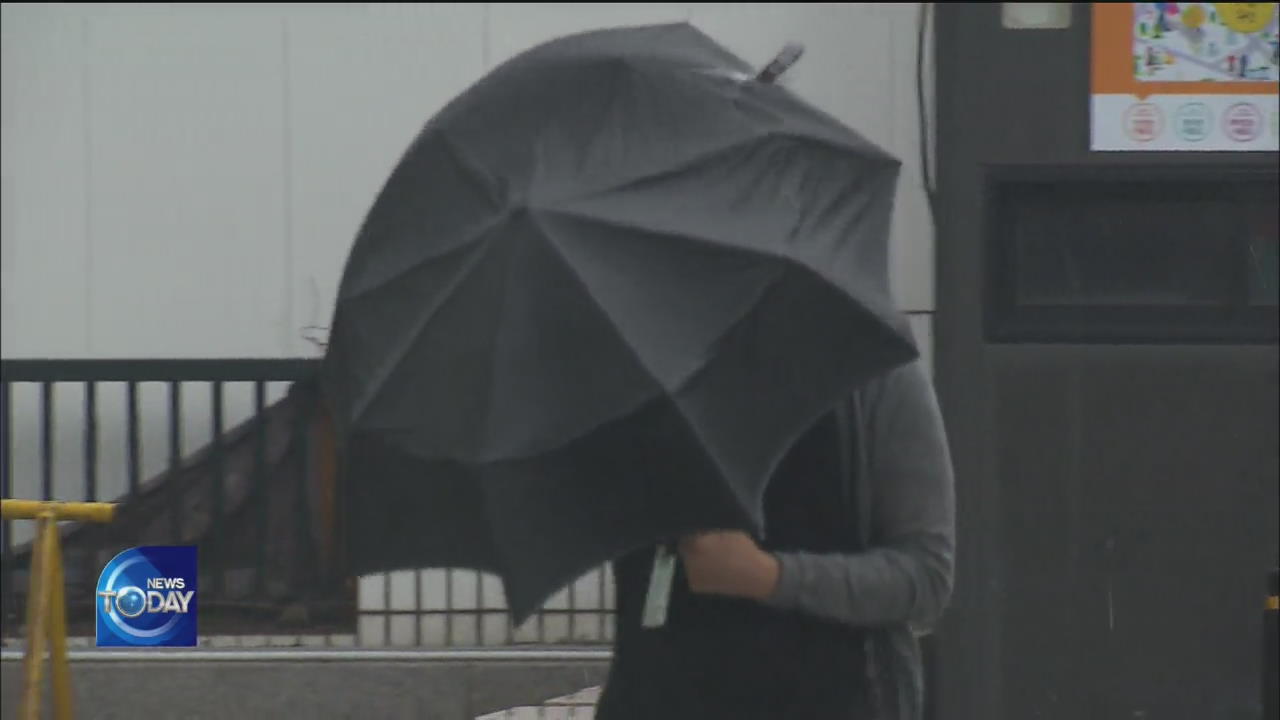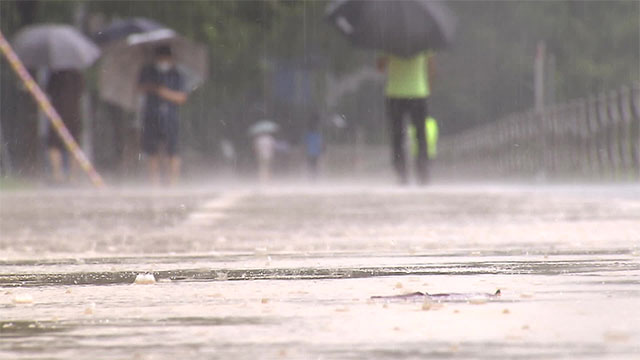TYPHOON ‘BAVI’ HITS THE KOREAN PENINSULA
입력 2020.08.26 (15:16)
수정 2020.08.26 (16:45)
읽어주기 기능은 크롬기반의
브라우저에서만 사용하실 수 있습니다.
[Anchor Lead]
We begin today's news with Typhoon Bavi, the 8th typhoon of the season, which is quickly approaching the western coast of the Korean Peninsula. Meteorologists predict it will be the most powerful typhoon ever to approach Korea through the West Sea.
[Pkg]
A camera is shaking in the gusty wind. Sea waves rise as high as seven meters. This is what Marado Island looks like with Typhoon Bavi 400km away. Satellite imagery shows Bavi has developed into a powerful typhoon. It gained strength while passing over the East China Sea, where water temperatures surpass 30 degrees Celsius. Bavi is expected to move northward and pass through the west coast of Jejudo Island this afternoon. The Korea Meteorological Administration predicts the storm will then cross the West Sea before making landfall in North Korea's Hwanghae-do Province at around 6 a.m. Thursday. Bavi is forecast to gain speed after entering the West Sea, where water temperatures are lower, while maintaining most of its force. Meteorologists expect Bavi to become the most powerful typhoon to ever arrive through the West Sea. It's predicted to bring gale force winds of 126km per hour rather than heavy rain.
[Soundbite] LEE KYUNG(KOREA METEOROLOGICAL ADMINISTRATION) : "Gale force winds are expected on Jeju-do Island, western regions and the southern coast, which are located to the right of the typhoon and close to its path."
The maximum instantaneous wind speed is forecast to reach 40-60 meters per second on Jejudo Island and the western coast, and 35 meters per second in western regions and on the southern coast. On Thursday morning, strong winds from the ocean is expected to reach the Seoul metropolitan area. When Typhoon Lingling hit Korea last year, its winds blew away steel towers and walls, and caused extensive damage to farms and construction sites. That's why securing facilities thoroughly is important this time to minimize damage.
We begin today's news with Typhoon Bavi, the 8th typhoon of the season, which is quickly approaching the western coast of the Korean Peninsula. Meteorologists predict it will be the most powerful typhoon ever to approach Korea through the West Sea.
[Pkg]
A camera is shaking in the gusty wind. Sea waves rise as high as seven meters. This is what Marado Island looks like with Typhoon Bavi 400km away. Satellite imagery shows Bavi has developed into a powerful typhoon. It gained strength while passing over the East China Sea, where water temperatures surpass 30 degrees Celsius. Bavi is expected to move northward and pass through the west coast of Jejudo Island this afternoon. The Korea Meteorological Administration predicts the storm will then cross the West Sea before making landfall in North Korea's Hwanghae-do Province at around 6 a.m. Thursday. Bavi is forecast to gain speed after entering the West Sea, where water temperatures are lower, while maintaining most of its force. Meteorologists expect Bavi to become the most powerful typhoon to ever arrive through the West Sea. It's predicted to bring gale force winds of 126km per hour rather than heavy rain.
[Soundbite] LEE KYUNG(KOREA METEOROLOGICAL ADMINISTRATION) : "Gale force winds are expected on Jeju-do Island, western regions and the southern coast, which are located to the right of the typhoon and close to its path."
The maximum instantaneous wind speed is forecast to reach 40-60 meters per second on Jejudo Island and the western coast, and 35 meters per second in western regions and on the southern coast. On Thursday morning, strong winds from the ocean is expected to reach the Seoul metropolitan area. When Typhoon Lingling hit Korea last year, its winds blew away steel towers and walls, and caused extensive damage to farms and construction sites. That's why securing facilities thoroughly is important this time to minimize damage.
■ 제보하기
▷ 카카오톡 : 'KBS제보' 검색, 채널 추가
▷ 전화 : 02-781-1234, 4444
▷ 이메일 : kbs1234@kbs.co.kr
▷ 유튜브, 네이버, 카카오에서도 KBS뉴스를 구독해주세요!
- TYPHOON ‘BAVI’ HITS THE KOREAN PENINSULA
-
- 입력 2020-08-26 15:30:28
- 수정2020-08-26 16:45:16

[Anchor Lead]
We begin today's news with Typhoon Bavi, the 8th typhoon of the season, which is quickly approaching the western coast of the Korean Peninsula. Meteorologists predict it will be the most powerful typhoon ever to approach Korea through the West Sea.
[Pkg]
A camera is shaking in the gusty wind. Sea waves rise as high as seven meters. This is what Marado Island looks like with Typhoon Bavi 400km away. Satellite imagery shows Bavi has developed into a powerful typhoon. It gained strength while passing over the East China Sea, where water temperatures surpass 30 degrees Celsius. Bavi is expected to move northward and pass through the west coast of Jejudo Island this afternoon. The Korea Meteorological Administration predicts the storm will then cross the West Sea before making landfall in North Korea's Hwanghae-do Province at around 6 a.m. Thursday. Bavi is forecast to gain speed after entering the West Sea, where water temperatures are lower, while maintaining most of its force. Meteorologists expect Bavi to become the most powerful typhoon to ever arrive through the West Sea. It's predicted to bring gale force winds of 126km per hour rather than heavy rain.
[Soundbite] LEE KYUNG(KOREA METEOROLOGICAL ADMINISTRATION) : "Gale force winds are expected on Jeju-do Island, western regions and the southern coast, which are located to the right of the typhoon and close to its path."
The maximum instantaneous wind speed is forecast to reach 40-60 meters per second on Jejudo Island and the western coast, and 35 meters per second in western regions and on the southern coast. On Thursday morning, strong winds from the ocean is expected to reach the Seoul metropolitan area. When Typhoon Lingling hit Korea last year, its winds blew away steel towers and walls, and caused extensive damage to farms and construction sites. That's why securing facilities thoroughly is important this time to minimize damage.
We begin today's news with Typhoon Bavi, the 8th typhoon of the season, which is quickly approaching the western coast of the Korean Peninsula. Meteorologists predict it will be the most powerful typhoon ever to approach Korea through the West Sea.
[Pkg]
A camera is shaking in the gusty wind. Sea waves rise as high as seven meters. This is what Marado Island looks like with Typhoon Bavi 400km away. Satellite imagery shows Bavi has developed into a powerful typhoon. It gained strength while passing over the East China Sea, where water temperatures surpass 30 degrees Celsius. Bavi is expected to move northward and pass through the west coast of Jejudo Island this afternoon. The Korea Meteorological Administration predicts the storm will then cross the West Sea before making landfall in North Korea's Hwanghae-do Province at around 6 a.m. Thursday. Bavi is forecast to gain speed after entering the West Sea, where water temperatures are lower, while maintaining most of its force. Meteorologists expect Bavi to become the most powerful typhoon to ever arrive through the West Sea. It's predicted to bring gale force winds of 126km per hour rather than heavy rain.
[Soundbite] LEE KYUNG(KOREA METEOROLOGICAL ADMINISTRATION) : "Gale force winds are expected on Jeju-do Island, western regions and the southern coast, which are located to the right of the typhoon and close to its path."
The maximum instantaneous wind speed is forecast to reach 40-60 meters per second on Jejudo Island and the western coast, and 35 meters per second in western regions and on the southern coast. On Thursday morning, strong winds from the ocean is expected to reach the Seoul metropolitan area. When Typhoon Lingling hit Korea last year, its winds blew away steel towers and walls, and caused extensive damage to farms and construction sites. That's why securing facilities thoroughly is important this time to minimize damage.
이 기사가 좋으셨다면
-
좋아요
0
-
응원해요
0
-
후속 원해요
0










![[HEADLINE]](https://news.kbs.co.kr/data/news/2020/08/26/4525805_10.jpg)

![[단독] 위성락 실장 “전작권 협상 카드 아냐”…<br>차관 인선 발표](/data/layer/904/2025/07/20250713_krfuHu.jpg)




이 기사에 대한 의견을 남겨주세요.